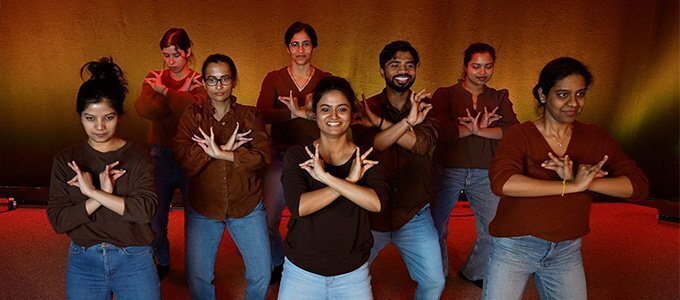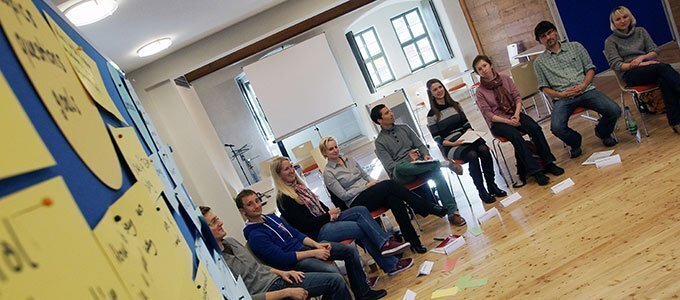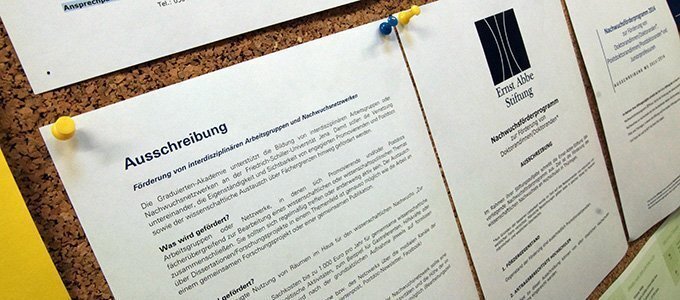|
 |
Events
- The 1st
Sustainability Week is taking place at
the University of Jena from 5 to 9 May. The action
week is dedicated to various aspects of
sustainability: for example, a bicycle repair day
will be held on the Ernst-Abbe-Platz campus on 7 May
and a workshop on paper consumption and saving paper
on 8 May. Throughout the week, there will be a
clothes and plant exchange fair in the foyer of
Carl-Zeiß-Straße 3. The week is organised by the
Green Office. (Picture above:
VectorMine/stock.adobe.com)
- During the summer semester, the ‘Gender
in Focus’ project is offering an interdisciplinary
series of events on topics related to
gender- and sex-sensitive research. The first event
on 29 April will cover the topic of ‘Networking,
focusing and keeping gender research open’. The
series is held in German and takes place every two
weeks in the lecture hall at Zwätzengasse 4.
- In a coffee
lecture, the five most important
research data management topics from recent years
will be presented – compact, practical, and for the
first time in English. Topics include data
organization, publication, documentation, and
requirements of funding institutions. The Coffee
Lectures take place online via Zoom on the last
Wednesday of each month at 14.00h.
- From 7 May to 28 May, the Diversity Days
will take place at the University of Jena. There
will be a market of opportunities on 27 May to get
to know offers on diversity and inclusion in
academic life. On campus, there will be a course
where you can try to master everyday working life in
a wheelchair. More events can be found here.
- The future of academic career paths in
Germany will be discussed in Berlin on 15 and 16
May: Is it possible to transfer the positive
experiences of the introduction of tenure-track
professorships to the establishment of permanent
positions beside professorships? The high-level
conference is being organised by the
University of Jena and the University of Freiburg in
cooperation with UniWinD and German U15. On-site
participation in the conference is no longer
possible – but there will be a livestream. One panel
discussion will be in English.
|
|
|
 |
Get
involved
- The photo
competition "Hats off!" will take place
again this year. In this competition the most
beautiful, self-made doctor hats will be awarded.
Photos of the hats can be submitted until 11 May. At
the beginning of June, you can vote for the photos
online. The awards will be given at the Schiller
Day.
- For the first time, the Graduate Academy has
submitted a video to the Dance
your PhD competition! The video
uses dance to visualise the dissertation of Jena
doctoral candidate Priya Reddy. She is conducting
research in the area of plant immune responses at
the Friedrich Schiller University Jena and the Max
Planck Institute for Chemical Ecology. (Picture
above: Youtube Screenshot)
- The European Council of Doctoral Candidates and
Junior Researchers offers a new
qualification programme. The aim is to
enable academics to understand and explore the role
of higher education and research for democracies in
Europe. There are two tracks of the programme:
Ambassadors and oberservers. Currently, you can
register as an observer to attend the online
lectures.
|
|
|
 |
Qualification
offers
There are still vacancies in the following online and
on-site workshops:
- Graduate Academy:
- Lehre Lernen:
- Competence Center Digital Research (zedif):
- Service Centre for Research and Transfer:
|
|
|
 |
Announcements
- The “Gender
in Focus” project offers a funding
programme and a prize: The ‘Young
Talent’ funding programme supports researchers
at the University of Jena by covering material and
travel expenses. The “Gender
Aspects in Focus 2025” award honours doctoral
theses (€750) and the work of advanced researchers
(€1000) in which aspects of sex and gender are
included. The application deadline for the funding
programme is 31 May, for the prize 30 April.
- The 6th FAIRest
Dataset Competition has started. You can
apply for it, if your dataset follows the FAIR
principles: It should be Findable, Accessible,
Interoperable, and Reusable. You can win a prize of
up to 2,000 euros! The submission deadline is April
15, 2025.
- The Thuringian Ministry of Education, Academia and
Culture is offering ten ‘Fellowships
for Innovations in Digital University Teaching
in Thuringia’. For example, projects
that develop or test digitally supported teaching
and examination formats are eligible for funding.
The fellowships are endowed with 50,000 euros.
Applications for a fellowship can only be submitted
via the University's Academy for Teaching
Development. The application deadline is 14 April
(10 a.m.).
- The Joachim Herz Foundation supports up to 80
researchers from the fields of engineering,
economics and life sciences with add-on
fellowships. The prerequisite is work on
innovative, interdisciplinary research projects and
the motivation to further develop the transfer
potential of one's own research. The scholarships
are endowed with 15,000 euros for two years. The
application deadline is 16 May.
|
|
|
 |
This
may be of interest to you
- The Trump
administration is placing the American
academic system under pressure: in its fight
against diversity and inclusion, it is cutting
funding programmes and suing
universities that do not end them. US-funded
students worldwide have also received
questionnaires asking about their connection to
China and their attitude towards diversity. In
addition to the fight against diversity, the
administration is also trying to end (alleged) anti-Semitism
at American universities: After New York's Columbia
University was stripped of 400 million US dollars in
research funding, the university "agreed"
to place its Middle East research department under a
new non-faculty official. At the same time, it forced
the expulsion of researchers who had allegedly taken
part in pro-Palestinian demonstrations –
resulting in pictures such as the one above,
notoriously showing the harsh expulsion of a
doctoral candidate.
- Negotiations
on a coalition between the christian
democrats and social democrats are still ongoing. At
the end of March, a paper with the current status of
the negotiations was leaked.
In the field of academia, a reform of the Academic
Employment Act is to be passed by 2026. Furthermore,
minimum contract terms before and after doctorates
are planned to be introduced and general conditions
for more permanent positions should be created. In
addition, a ‘1,000 Heads Programme’ is to be
established to provide a safe haven for threatened
researchers.
- A
study by the Centre for Higher Education has analysed
the effects of the retirement of the baby
boomers of the 1960s on the German academic
system. The result: an above-average number of
professorships will become vacant over the next ten
years - around 2,000 per year between 2029 and 2032.
The percentages were also calculated
for individual universities: 47.6 per cent of
professors at the University of Jena will turn 65
within the next ten years.
Back to the top
|
|
|
 |
Short
query: Safe haven for american researchers
The Trump administration is rapidly changing the
academic system in the USA (see here).
As a result of these developments, some researchers have
already left
the country and many others are thinking
about it. In this context, a debate is taking
place in Germany as to whether researchers from
the USA should be specifically recruited with
programmes. In this survey, we would therefore like to
know what’s your opinion about this. The survey will
take just about one minute.
To
the survey
Results of our latest survey on the retreat of
academics from X
In our last survey, we wanted to know what you thought
about the withdrawal of the scientific organisations
from X: almost two thirds approved of this withdrawal,
16 per cent regretted it and 13 per cent thought the
fuss surrounding the topic was too great. Around half of
the respondents stated that they had never used X.
However, more than a third also stated that they had
withdrawn from X. 16 per cent still use X passively.
|
|
|
 |
News
from University of Jena
- The university
originally planned to build a new science campus
on the Bachstrasse area. The institutes for
pharmacy, nutritional science and data science were
supposed to move in. It has now been revealed
that the state of Thuringia has stopped the
construction plans as they are too
‘oversized’. The university should now develop a new
concept in which only the Institute of Pharmacy is
located there. The new buildings are expected to be
finished in the early 2030s. Despite this relapse in
planning, the city of Jena has just launched
a participatory process (in German) to integrate the
site into the city in the best possible way. Until
31 May, three urban development concepts can be
decided on. (Image design above: De Zwarte Hond)
- In March 2025,
Friedrich Schiller University received the HR
Excellence in Research Award. This seal
of quality has been awarded by the European
Commission since 2008 to research institutions
that pursue a strategy to promote excellent working
conditions for researchers. As part of the
application process, the university developed an action
plan that is now to be implemented by 2027.
- The Office for
Digital Transformation has developed
a new self-study course on the use of generative
AI in higher education. It offers an initial
introduction to the use of generative AI and is
primarily aimed at students. However, the course may
also be of interest to lecturers and staff.
Currently, the course is only available in German.
- In two different
projects, researchers in Jena have investigated
odours: In one project, 1,200 people were
asked to describe how they perceive and evaluate 74
specific odour samples. In a second project, 2,600
test subjects were asked what vocabulary they would
use to describe body odours – particularly from
different parts of the body. From both studies,
odour description databases were developed and made
available to the public in the form of an app.
|
|
|
 |
Latest
News from Jena and Thuringia
- A pair of peregrine falcons are breeding
again in the steeple of Jena's city church.
The tower has a wooden nesting box equipped with a
camera. To ensure peace and quiet for the breeding
rare birds, the church tower cannot be climbed until
July. However, images from the live cam of this
inner-city falcon nest can be viewed at the entrance
to the church.
- The new
Thuringian government has approved
the state budget for 2025. The negotiations
took three months – especially as the coalition does
not have its own majority in the state parliament. A
compromise was reached with the parliamentary group
Die Linke: The third year of kindergarten is to be
free of charge. In addition, the financially
troubled Jena University Hospital is to
receive a three-year loan totalling 122 million
euros.
- Now we know for sure: the modern sausage grill
was invented in Jena! The head of a Jena engineering
company presented
evidence to the local press last month that
his grandfather had revolutionised the design of the
grill in 1924. He introduced the air chamber under
the coal grate and the typical ash pan at the bottom
of the structure. Previously, coals had been placed
directly on stone or iron plates so that fresh air
had to be supplied by blowing it in when there was
no wind. (Picture above: Archive Fa. Pelzer)
- Jena has got its first 24-hour late-night shop.
The “Kiez-Kiosk” was opened
at Lutherstraße 77. Three large vending machines
sell items such as Korean instant noodles, milk
cartons, lighters, condoms, pregnancy tests and
cannabis seeds. It is the third vending machine
trial in Jena: previously there had already been a
honey vending machine and a pub
vending machine (with traditional German
dishes).
Back to the top
|
|
|